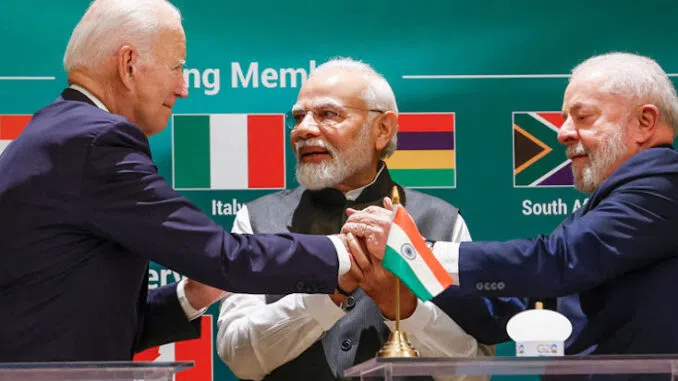In the midst of this brave new world where digital IDs and cashless societies are becoming the norm, one can't help but wonder, are we stepping into a utopia of convenience or a surveillance dystopia? The G20 leaders seem to think they have all the answers, rolling out these initiatives without giving the public a say. But hey, who needs the hassle of democracy when you can have strict international crypto regulations and government-controlled digital currencies, right? It's not like cryptocurrencies offered any pesky financial freedom anyway. So, let's raise our virtual glasses to the brave new world ahead! More on this below. Keep reading for your daily dose of digital delight.
Last week, the leaders of the G20 convened to sign an agreement to implement the "digital IDs" and "cashless societies" proposed by the World Economic Forum (WEF). These initiatives are set to become mandatory for all individuals who wish to participate in society. Notably, these policies are being imposed on the populations without affording them an opportunity to vote on the matter.
Additionally, the globalist organization disclosed ongoing discussions aimed at establishing stringent international regulations for cryptocurrencies. These regulations are expected to pave the way for governments to replace cryptocurrencies with central bank digital currencies (CBDCs).
Indian Finance Minister Nirmala Sitharaman highlighted the ongoing efforts to create a global framework for regulating crypto assets. World leaders, she asserted, believe that cryptocurrencies cannot be effectively regulated without international cooperation.
Key topics addressed at the New Delhi summit included the development of Digital Public Infrastructure, the promotion of the Digital Economy, discussions about Cryptoassets, and Central Bank Digital Currencies (CBDCs). Gita Gopinath, the first deputy managing director of the International Monetary Fund (IMF), emphasized that the G20 has played a pivotal role in shaping a global perspective on how policymakers should handle crypto assets. She reassured that there was no talk of banning cryptocurrencies during the discussions, indicating a global consensus against such measures.
However, some of the proposals discussed call for increased oversight of cryptocurrencies. Cryptocurrencies are decentralized and not under the control of central banks, which makes them difficult for governments to monitor. Critics argue that these proposals could open the door for governments to implement a social credit scoring system and dictate how citizens can spend their money, potentially leading to instant repercussions for dissenting views.
During the summit, European Commission President Ursula von der Leyen advocated for the establishment of an international regulatory body for artificial intelligence (AI). She also announced the development of digital ID systems based on the EU's vaccine passport infrastructure. Von der Leyen called for global cooperation to facilitate the adoption of digital IDs and address AI-related challenges. She suggested that the United Nations should play a role in regulating AI and praised the EU's COVID-19 digital certificate as a model for digital public infrastructures (DPI), which would encompass digital IDs.
The European Union is currently working on introducing a bloc-wide "digital identity" app that would consolidate various personal information, including passports, driver's licenses, and medical records.
The Cato Institute's 2023 CBDC National Survey found that only 16 percent of Americans support the adoption of CBDCs. A significant majority, 68 percent, expressed opposition to CBDCs if the government were to monitor their transactions. Concerns were raised by both Democrats and Republicans about potential government control over spending and access to bank accounts.
IMF Managing Director Kristalina Georgieva praised Indian counterparts for leading the way in establishing a roadmap for crypto regulations. She noted that the IMF was actively contributing to proposals for a comprehensive policy framework in this regard.
Several major economies, including Japan and Russia, are planning to launch pilot CBDCs this year. However, Nigeria's eNaira, the world's first issued CBDC, has encountered low usage, with less than 0.5 percent of citizens reporting its use.
The World Bank also commended India's use of digital public infrastructure in enhancing financial inclusion and the delivery of public services in a report presented at the G20 summit. India's India Stack DPI system, comprising the Aadhaar digital ID and the interoperable UPI digital payments platform, served as an example in the report. The G20 believes that DPIs can extend beyond the financial sector to benefit areas such as health, education, and social welfare.
While CBDCs hold promise for expanding financial access, the debate over digitalization has raised concerns in the Netherlands regarding the Dutch monarchy's involvement in politics. Queen Maxima's endorsement of programmable money and power in central banks, without parliamentary accountability, has sparked criticism, with some considering it a threat to democracy.
In summary, the G20 leaders have taken significant steps toward implementing digital IDs, cashless societies, and cryptocurrency regulations, with a focus on CBDCs. These developments raise important questions about individual privacy, government control, and democratic accountability in the digital age.
My Final Hot take: Who needs privacy and financial independence when we can have digital IDs and CBDCs? It's not like those old-fashioned values were worth keeping anyway!
Free Speech and Alternative Media are under attack by the Deep State. Chris Wick News needs your support to survive.
Please Contribute via GoGetFunding

